Walkthrough — Call of Duty: World at War Wiki Guide
Call of Duty: World at War Wiki Guide
By Andrew Eisen, James Faulkner, Kojo Howe, +511 more
updated
This walkthrough covers the Regular difficulty setting. Although the Hardened and Veteran modes bring a lot more hurt, their objectives are identical. That applies to the simpler Recruit mode, too.
Specific directions (e.g., north, south) are provided to help you, but you don’t have to worry about following them precisely. There are not many branching paths in World at War, making it difficult to get lost. However, there are many wide-open areas, and some have multiple exits. Whenever you’re unsure, orient yourself by examining your compass; your destination is represented by the star emblem. When you reach the next objective, simply pick up from its related section within this guide, and continue. They should support you on anything to difficult to complete by try.
advertisement
Call of Duty: World at War Mission Walkthroughs
Select a mission from the list below.
- Semper Fi
- Little Resistance
- Hard Landing
- Vendetta
- Their Land, Their Blood
- Burn ’em Out
- Relentless
- Blood & Iron
- Ring of Steel
- Eviction
- Black Cats
- Blowtorch & Corkscrew
- Breaking Point
- Heart of the Reich
- Downfall
Up Next: Semper Fi
Previous
Combat Training
Next
Semper Fi
Was this guide helpful?
In This Wiki Guide
Call of Duty: World at War
Treyarch
Rating
ESRB: Mature
Platforms
WiiPCXbox 360PlayStation 3
Assassin’s Creed Codename Jade — Reveal Trailer
Ubisoft has announced Assassin’s Creed Codename Jade, a new game in the series set in Ancient China. It features “classic” Assassin’s Creed gameplay and takes place in an open world, but is a mobile game rather than a console release.
Silent Hill 2 Remake Vs. Remaster | Side-By-Side Comparison
James Sunderland and Silent Hill 2 (for that matter) are back for Konami’s new Silent Hill 2 Remake, which is slated for a 2023 release. Since Konami just released a new Silent Hill 2 trailer, we took the time to create a side-by-side comparison using Silent Hill 2 gameplay footage.
Loading
Mario + Rabbids Sparks of Hope — Combat Tips
Ant-Man and the Wasp: Quantumania Trailer
Super-Hero partners Scott Lang (Paul Rudd) and Hope Van Dyne (Evangeline Lilly) return to continue their adventures as Ant-Man and the Wasp. Together, with Hope’s parents Hank Pym (Michael Douglas) and Janet Van Dyne (Michelle Pfeiffer), the family finds themselves exploring the Quantum Realm, interacting with strange new creatures and embarking on an adventure that will push them beyond the limits of what they thought was possible. Jonathan Majors joins the adventure as Kang. The movie is produced by Kevin Feige and Stephen Broussard. Marvel Studios’ Ant-Man and the Wasp: Quantumania, directed by Peyton Reed, opens in theaters on February 17, 2023.
The movie is produced by Kevin Feige and Stephen Broussard. Marvel Studios’ Ant-Man and the Wasp: Quantumania, directed by Peyton Reed, opens in theaters on February 17, 2023.
Vendetta | Call of Duty Wiki
- For the semi-automatic sniper rifle in Call of Duty: Black Ops 4, see Vendetta (weapon).
This article contains multiple options that are determined by player choice.
Vendetta
Previous level
Hard Landing (in-game)
Semper Fi (chronologically)
Next level
Their Land, Their Blood (in-game)
Little Resistance (chronologically)
Game
Call of Duty: World at War
Character
Private Dimitri Petrenko
Team
62nd Rifle Division, Red Army
Place
Stalingrad, Stalingrad Oblast, Russian SFSR, Soviet Union
Date
September 17, 1942
Objective
Stay with Sgt. Reznov
Eliminate all Germans in the streets
Follow Sgt.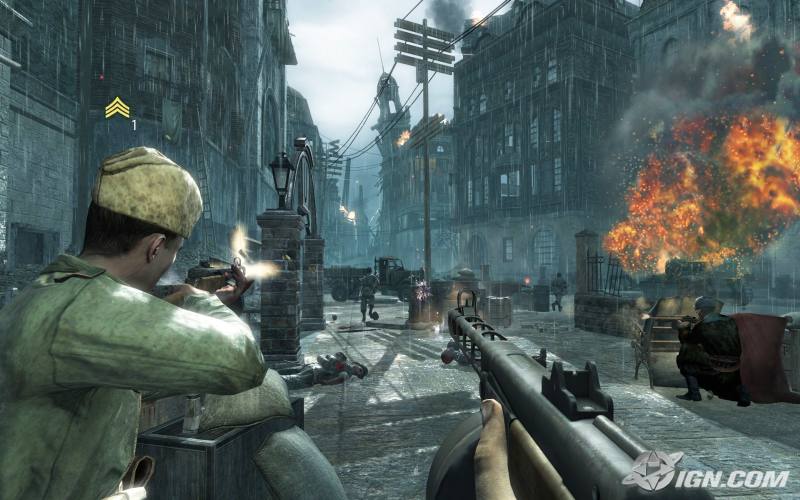 Reznov
Reznov
Defeat the enemy sniper
Support your comrades with sniper cover fire
Kill General Amsel
Enemies
Heinrich Amsel
Wehrmacht
Console codename
sniper
Multiplayer map
Revolution
Zombies map
Gorod Krovi
- «Assist the injured Sgt. Reznov in assassinating the Nazi General Amsel.«
- — Level description
- «I need your help. Do what I say, and we can avenge this massacre.«
- — Reznov at the start of the level.
«Vendetta» (Italian for «Revenge«) is the fourth (chronologically the second) mission of the campaign in Call of Duty: World at War. Private Dimitri Petrenko and Sergeant Reznov, two soldiers from the Soviet Union’s Red Army, attempt to assassinate General Heinrich Amsel after surviving an attack by the German Wehrmacht in Stalingrad. It is the first mission of the European Theater, and is unable to be played in co-op mode.
Contents
- 1 Characters
- 2 Plot
- 3 Video Walkthrough
- 4 Weapon Loadout
- 5 Gallery
- 6 Achievements/Trophies
- 7 Transcript
- 8 Trivia
Characters
- Dimitri Petrenko (playable)
- Viktor Reznov (W.I.A.)
- Daletski (Alive/K.I.A.) (Player determined)
- Heinrich Amsel (K.I.A.)
Plot
Dimitri Petrenko, a member of the Red Army, awakes in a fountain located in Red Square in the city of Stalingrad. He is dazed and his vision comes and goes. The fountain is filled with dead Russians, as well as wounded Russians. A German patrol goes by as some of the Germans walk into the fountain and execute the wounded Russians. Petrenko remains still and he is not noticed. As the Germans move on, Petrenko begins to crawl forward. Suddenly, one of the bodies starts to move in front of him. The man is Viktor Reznov. He tells Petrenko that he needs his help assassinating General Heinrich Amsel, an infamous commander in the German army in Stalingrad. He is responsible for many other massacres throughout the Motherland. Reznov has hunted Amsel for many days now.
He is responsible for many other massacres throughout the Motherland. Reznov has hunted Amsel for many days now.
Since his hand is injured, Reznov gives Petrenko his sniper rifle, a scoped Mosin-Nagant. The two move to a spot in the fountain where they can see Amsel’s men standing guard next to a building. Amsel soon arrives and enters the building while talking to another German soldier. Reznov explains that they cannot give away their location yet or they will be overrun. The duo wait until German bombers are directly above them before Petrenko takes out the men standing guard. Reznov and Petrenko close in for the kill when a German armored patrol arrives. The two sneak off into a nearby bar to find another way to Amsel. They sneak into the back where a death card may be found.
As they exit the building, Reznov tells Petrenko that Amsel inspects each German garrison everyday. Because of this Reznov knows where Amsel is going. As they prepare to enter a building that will allow them to flank Amsel’s route, a sniper fires on them.![]() The bullet almost hits Reznov. The two duck into the building as the sniper fires again. The two move upstairs where Reznov draws the sniper’s fire. Once it is revealed where the sniper is, Reznov draws the sniper’s fire again. If the player does not take out the sniper during Reznov’s distraction, then the player must kill the sniper on his own by waiting for the sniper to reveal himself and fire on the player.
The bullet almost hits Reznov. The two duck into the building as the sniper fires again. The two move upstairs where Reznov draws the sniper’s fire. Once it is revealed where the sniper is, Reznov draws the sniper’s fire again. If the player does not take out the sniper during Reznov’s distraction, then the player must kill the sniper on his own by waiting for the sniper to reveal himself and fire on the player.
Once the sniper is taken out, Reznov and Petrenko move downstairs where another German patrol is moving by outside. The two hide as the patrol passes. Unfortunately, the chime of a grandfather clock gives away their position, causing one of the German soldiers to stop and move towards the window where Reznov and Petrenko are hiding. The soldier sees them and a dog begins barking to alert the others to their presence. Reznov tells Petrenko to hit the floor as German flamethrowers move up to burn the building. If the player does not go prone, the fire will start to burn them. As Reznov and Petrenko move through the building, a burning plank falls on Petrenko. Reznov removes it and the two jump down to the street below before the building completely erupts with fire.
As Reznov and Petrenko move through the building, a burning plank falls on Petrenko. Reznov removes it and the two jump down to the street below before the building completely erupts with fire.
Outside, more Germans arrive. They find Reznov and Petrenko and they tell a soldier with a flamethrower to burn their bodies. Suddenly, bullets shoot out from a nearby building killing the Germans. Russian soldiers arrive, surprised at how both men survived the massacre at the Square. They inform Petrenko and Reznov that they are about to assault a German communications outpost. Since this will prevent Amsel from calling for help, Reznov agrees to help.
Petrenko and Reznov head to higher ground to provide sniper support. Once the communications building is secured, Reznov shows Petrenko to a good sniping position overlooking the German command post. The two reach the sniping position as German reinforcements slaughter the Russians in the communications outpost.
This decision is required for Chernov to say the «good» or «neutral» quote when «Downfall» begins.
Petrenko reveals his location while sniping some Germans, but there are so many that they still slaughter the Russians. Reznov is unhappy that he gave away their location, but Chernov views his action as heroic.
This decision is required for Chernov to say the «evil» or «neutral» quote when «Downfall» begins.
Reznov and Petrenko watch this, as they do not want to help and reveal their position.
The sounds of battle draw Amsel out of hiding. He is surrounded by many body guards.
The player can kill Amsel anytime he is moving from cover. If the player waits long enough, a car will arrive and Amsel will get in. If the player shoots the driver then Amsel will get out and start running. This is the last chance the player has to kill Amsel before he escapes. Once Amsel is shot a tank spots the two men and it opens up on them. Reznov and Petrenko run further into the building as the tank keeps firing. After killing many Germans trying to enter the building, Reznov and Petrenko reach a dead end.![]() The only way out is to jump into the river below them. They jump as more Germans enter the building.
The only way out is to jump into the river below them. They jump as more Germans enter the building.
Video Walkthrough
Call of Duty World at War — Campaign — Vendetta
Weapon Loadout
| Starting Loadout |
|---|
|
Mosin-Nagant, scoped |
| Found in level |
|---|
|
Kar98k. Used by the Wehrmacht M2 Flamethrower. Used by the Wehrmacht, not available unless one gets out the map. MG42. Emplaced weapon Mosin-Nagant. Used by the Red Army MP40. Used by the Wehrmacht Walther P38. Dropped by enemies in Last Stand and found on a table in beginning of level PPSh-41. Used by Sgt. Reznov and the Red Army PTRS-41. Found throughout the level |
Gallery
The fountain of dead Russians.
The scoped Mosin-Nagant.
Reznov and Petrenko escaping the burning building.
Reloading the Mosin-Nagant.
Aiming down the Mosin-Nagant.
Victor Reznov in the Fountain
Achievements/Trophies
Architect (30 / Bronze Trophy ) — Complete Vendetta on Veteran.
The Professional (15 / Silver Trophy ) — Kill all of the German soldiers and the dogs in the beginning of the mission, without reloading.
Gunslinger (15 / Silver Trophy ) — Assassinate General Amsel with a pistol shot.
Transcript
- Main article: Vendetta/Transcript
Trivia
- At the beginning of the mission, Reznov is referred to as a sniper, but after he gives the player his rifle, he becomes identified as a submachine gunner.
- Also at the beginning of the mission, if the player goes to the back of the fountain after picking up the Mosin, some of the bodies seen at the start of the mission will have disappeared. Along with this a soldier laying on the ground can be seen moving his head around. Though they will appear unmarked when the players crosshairs are over him.
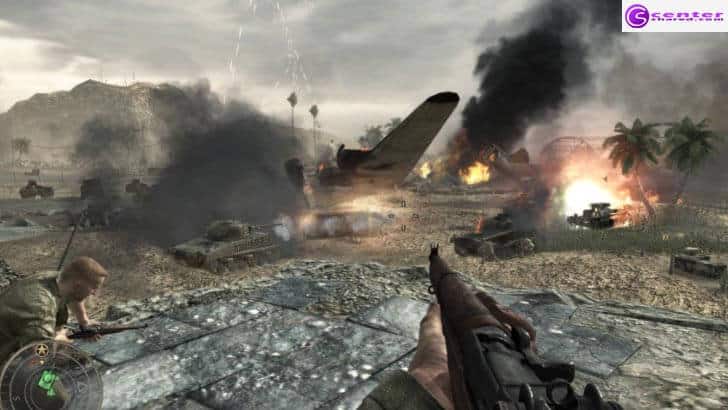
- The player will have unlimited ammo in this level. When they run out of ammo and switch weapons, Reznov will tell the player «Take the Shot» and the player’s reserve ammo will be refilled.
- Once up in the building (up the ladder) for fire support, the player can’t go down, and immediately gets shot down by Germans if proceeding into the street.
- The dogs in this mission are omitted in the Wii version of the game.
- This level bears a striking resemblance at times to the 2001 Jean-Jacques Annuad film Enemy at the Gates. Specifically, in both the movie and this level, two riflemen are united in a fountain following the Stalingrad massacre and engage German units from the fountain with a Mosin-Nagant rifle, using the sound of bombs to cover their shots. Later in the level, the player and Reznov enter a department store in trail of a German sniper; this is also a scene from Enemy at the Gates.
- If the player shoots any German soldier while hip-firing a sniper rifle, Reznov will compliment by saying «No scope?! Nice!», in a surprised tone.

- If one reveals their position to the men in the Red Square, Reznov will immediately have a PPSh-41 appear in his hands instead of picking up the one on the ground.
- There are less planes in this level on the Wii version of the game.
- Strangely enough, the Kar98k used by the Wehrmacht sniper has no scope.
- When the mission begins, after Reznov says he needs the player’s help, when the player crawls to him there will be a blood stain on the ground shaped like the grim reaper.
- At the spot where Daletski’s men come to aid the player and Reznov, there are four Russian soldiers who are dead and leaning up against the wall, the bloodstains behind the one on the far left and the one beyond that one are vaguely shaped like a bag of grenades, the other two are shaped like the grim reaper.
- In the German version, the Wehrmacht Soldier’s line «verbrennt diese Russenschweine!» is entirely omitted.
- If the player waits too long at the very end of the of the mission to jump into the river, an enemy tank will automatically kill the player.
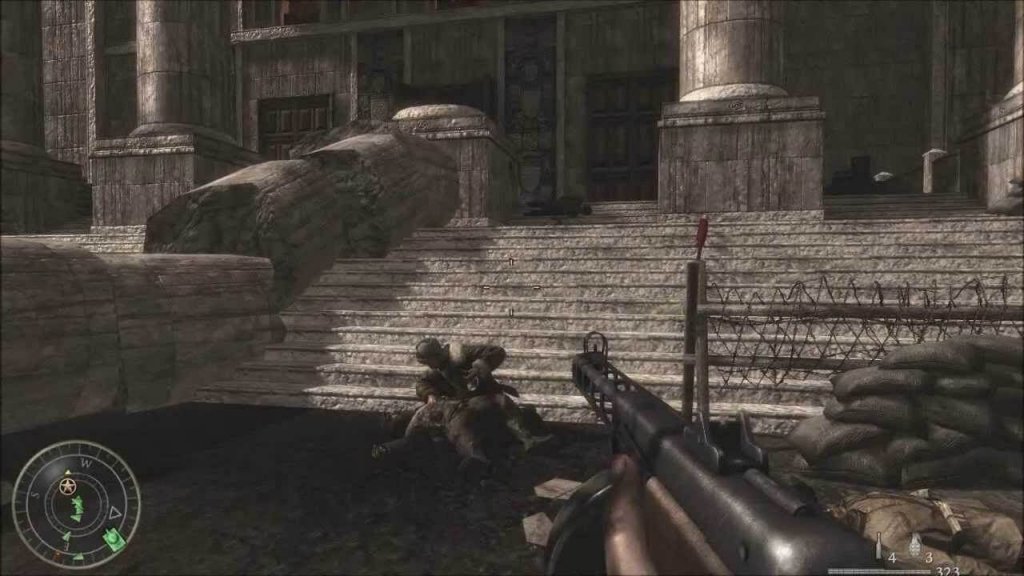
Prejudice of the world in the days of war
War is dirty, disgusting, criminal. But as long as the parties refuse to look for a worthy outcome from it, they drag out the war and force its cruelties. The pathological desire to “win” during negotiations leads to an increase in the price of the settlement. The truth of the current war is that no one can win it and therefore does not want to end
«Peace is not the absence of war, but a virtue bestowed by fortitude.» In writing this, Spinoza bestowed free banality on the coming times. It remains to understand what to consider the absence of peace?
The most noticeable thing in international affairs today is precisely the lack of peace and interest in it. Not only the warring participants in the Ukrainian conflict, but also dozens of countries indirectly involved in it do not want to hear about peace — the firmness of spirit requires them to win. The terms «negotiations», «truce», «compromise», «peace» sound like a traitor’s darkroom.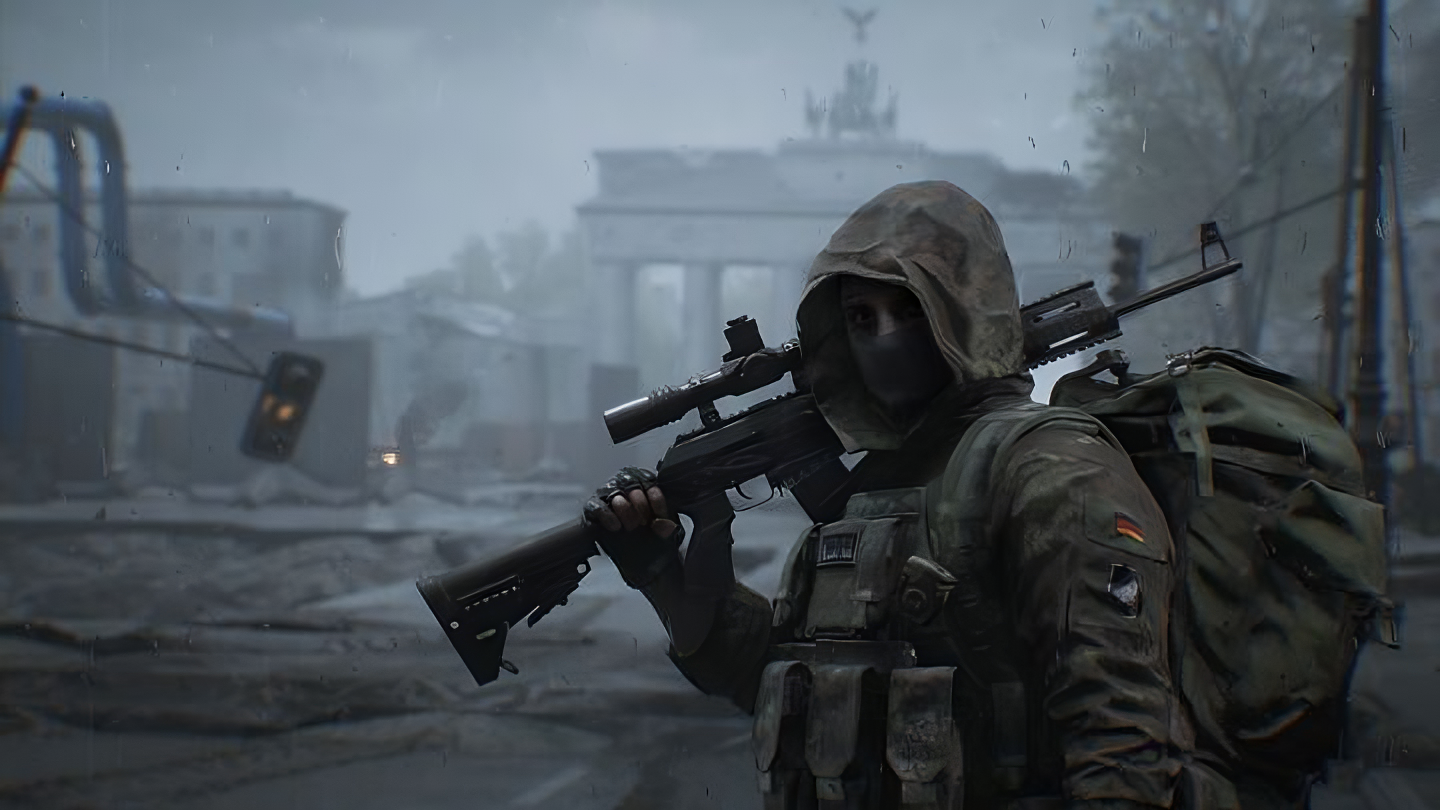
Having captured human space, war becomes the norm. A person quickly gets used to the «norm of anomaly», as evidenced by tons of series and books. But, having got used to it, he does not know how to get out. People are afraid to approach the end of the war, like a high-voltage fence. The post-war reality scares them rightly.
One way or another, wars end with a peace treaty, no matter how many people try to deny this fact now. Participants in the military conflict in Ukraine reject the idea of negotiations and speak only of victory or surrender. I don’t recall a military conflict where diplomacy was so vehemently rejected by all sides.
The vacuum of diplomacy is being filled with statements brushing aside compromise. Russia and Ukraine are flaunting their lack of interest in non-military solutions, increasing the noise of accusations. However, they have no experience of successful agreements that would not be violated. The Minsk agreements are an example of a resounding failure.
Where are the targets?
Only today, when the war is already underway, its goals are outlined. The political is replaced by the territorial, the actions of the parties are projected onto the map. The military, who have not been given a clear goal, sees a natural asset in the occupied territories. Towns and cities of Ukraine replace their missing target.
Moscow’s goals are vague, because they were not clarified initially. We are dealing with improvisation, the lack of thought of which relieved us of the task of coldly considering the risks of war. But there is an abyss of motives for historical revenge. There is an act of sovereign nihilism with a secondary goal of occupying generally useless territories. Within this is an attempt to restore the world power of Russia in its opposition to the world — the return motif of October 1917th.
The goals of the «collective West» in this war are also confused. The stress of the European Union, facing the fact of a big war in Europe with the potential for unlimited expansion, is clear. Ukrainian statehood literally survives, but the European project will also be overturned in circumstances of survival.
Ukrainian statehood literally survives, but the European project will also be overturned in circumstances of survival.
An event is taking place that is incompatible with the foundations of the EU, as they were conceived 30 years ago in Maastricht. The European strengthens Ukrainian self-defense — a front that does not require him to personally engage in mortal combat. A fiery wave of public support for Ukraine and nationwide fury towards Russia and Russians is a natural reflex when life is threatened.
The US introduces the usual ambivalence of a practical approach with an eye to «American leadership and global interests.» While the European sacrifices economic comfort for the sake of anti-Russian sanctions under the slogan «Never again!», the US is discussing how to achieve this goal in practice. By what means should Russian excesses of this kind be ruled out once and for all?
Sanctions as war
Anti-Russian sanctions exacerbate the matter. They have already gone through a number of different phases. The first phase (February-March) was reactive. Already developed sanctions were hastily introduced, without yet changing the level of burden on the Russian economy. They were hit by a wave of private corporate sanctions, an emotionally motivated protest due to the shock of the Russian-led war. The shock of suddenness, incompatible with the post-war world order — real or apparent, but remaining a European value.
The first phase (February-March) was reactive. Already developed sanctions were hastily introduced, without yet changing the level of burden on the Russian economy. They were hit by a wave of private corporate sanctions, an emotionally motivated protest due to the shock of the Russian-led war. The shock of suddenness, incompatible with the post-war world order — real or apparent, but remaining a European value.
Sanctions of the second phase — punitive «hell sanctions». This is an act of war of annihilation. The question of the procedure and timing of their abolition is absurd, as is the question of the commercial viability of carpet bombing. An act of rage carries only one message — we will ruin you. You won’t be.
The political goal is the irreversible isolation of Russia from the world order, discarding it in pre-Petrine times. The equations «Isolated Russia — impoverished Russia — Russia surrendered and harmless» are being built. The future is entrusted to war, from which the future world will miraculously grow.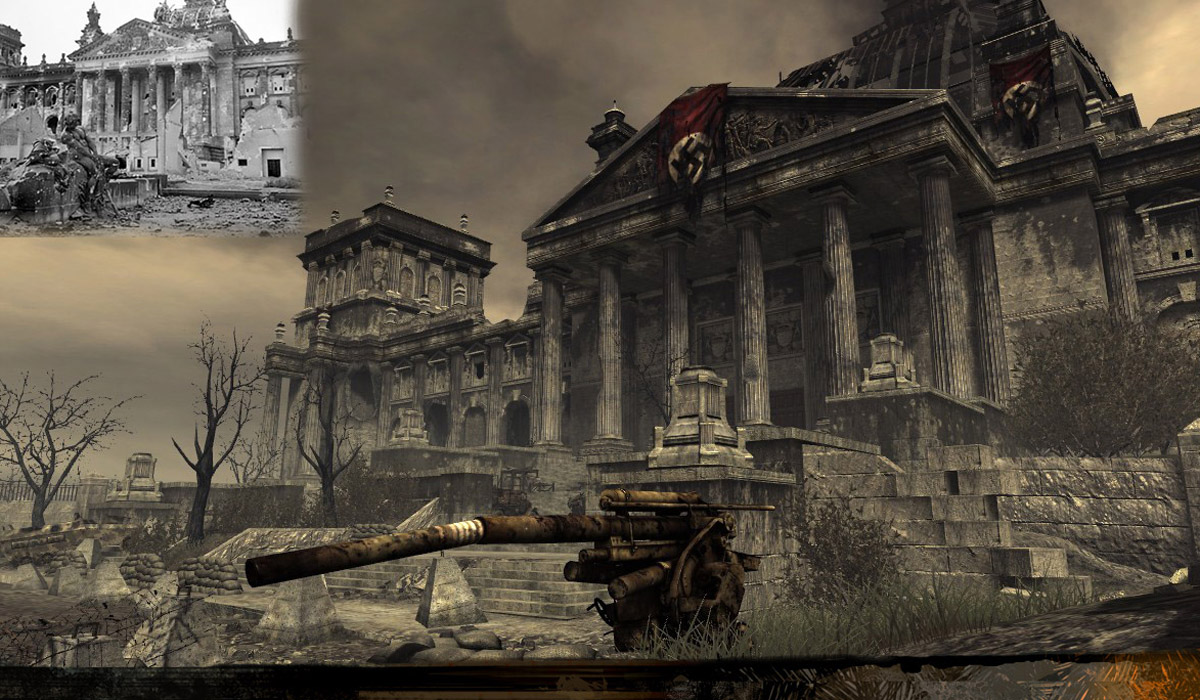 The price will be the half-life of all known global institutions.
The price will be the half-life of all known global institutions.
What would the success of Russia’s global isolation strategy mean? Another world order, but not only. It would be a new military order — the military consolidation of the world. The world of warlike, consolidated through the war.
The second phase has come close to the line of military sanctions. The supply of arms to Ukraine in homeric volumes, regardless of the readiness of the Armed Forces of Ukraine to use them. And it is also an act of war. As an act of war, it is non-local and claims to stimulate the entire space of war, including horizontal escalation with the export of military acts to new territories.
New world?
Is there a war going on in Europe for a new image of the world order? The participating countries litter propagandists and retired generals with ideological memes. A banal dirty local military conflict is played in the props of the Second World War and the Great Patriotic War. There is no debate about the contours of the Beautiful Future World Order — “we will discuss after our victory and your surrender!”.
There is no debate about the contours of the Beautiful Future World Order — “we will discuss after our victory and your surrender!”.
Avoiding specifying their priorities, Russia and Ukraine depict chthonic worlds, eternally opposed to one another. The Europeanism of Ukraine is its regimental banner. Such is Russian anti-liberalism. There is little non-import in Putin’s anti-Westernism — this is a reassembly from European spare parts.
The transformation of the military 3D reality of war shifts the dimensions of time/space. Today there is no Russian analytical language capable of talking about this at least the way we discuss political intrigues. Russia is now a country with only partly recognized borders. Borders are drawn into a strategic game with a growing potential for escalation.
War verticalizes Ukraine. It makes a choice within its usual vertical-grassroots duality. There are no guarantees that the war will preserve the former Ukrainian pluralism of society and authorities, expressed by the powerful symbol of the Maidans.
The long depoliticization of the Russian bottom and top led to the decline of the culture of negotiations, up to a misunderstanding of their function. In the utopian-vindictive thinking of a contemporary, the negotiating table is erected on the hump of a crushed enemy, like the khan’s benches after the Battle of Kalka.
Reluctantly approaching negotiations, the belligerents force the image of their victory. Negotiations begin with ultimatum demands to capitulate. It is not easy to get out of the military circle of thinking, to look for solutions outside of it. But the enemies are gradually beginning to change, without even noticing it, and the thought of life after the war appears. The goal of «victory» is malignant — it paralyzes the will to settle. «Victory» as such is seen as the «final solution» of the issue. But the diplomatic settlement is especially despised!
Opposition circles in Russia have long been inhabited by the mood of American opponents of the Vietnam War-pisniki, as if a unilateral retreat of the authorities is the only way out of a difficult situation. Despite the darkness of denials, the belief in the beneficialness of defeat has been preserved since 1917. War is an extended political event and ends as such. The trouble is that the Russian System is losing the skill of dealing with political things, of keeping both sides of the issue, political and military, in sight.
Despite the darkness of denials, the belief in the beneficialness of defeat has been preserved since 1917. War is an extended political event and ends as such. The trouble is that the Russian System is losing the skill of dealing with political things, of keeping both sides of the issue, political and military, in sight.
Military assistance pleases the defending side, but also creates illusions. The catastrophe of the French army in Vietnam was facilitated by the colossal volumes of American military aid (larger than Western aid to Ukraine). The aid forced France to go deeper into the war than she wished, and her military disaster was deafening.
The difference between people of good will and supporters of the escalation today looks polarized, but this is an illusion if we are talking about a radical moralist. The moralist demands that the conscience-disturbing phenomenon cease to exist immediately! He opposes the petty moves of the policy of compromise, they look like a rapprochement with Evil. It slows down timid encroachments to negotiations (which is why they often have to be started in secret). He does not understand that negotiations that do not begin mean not only the continuation of the war known to him: his conscience puts up with this.
It slows down timid encroachments to negotiations (which is why they often have to be started in secret). He does not understand that negotiations that do not begin mean not only the continuation of the war known to him: his conscience puts up with this.
But a war stuck in hopelessness runs the risk of slipping into Clausewitz’s «absolute war» — a duel of mutual destruction. The annoyance of the unachieved goals of the parties, accumulating, is looking for an outcome in the aggravation of the current military-political situation. And then the use of means that were considered unthinkable suddenly seems to be the last solution.
From the trench to the table
War is a stream of acts of damage. When the amount of damage goes beyond the planned limits and becomes excessive, attempts begin to limit it by means of diplomacy.
Any war, won, lost or led to a bloody stalemate, ends in negotiations, but in Russia even this banality is considered treacherous.
At the entrance to the negotiations, Russia needs to know that the Ukrainians will have no interest in progress in them, and the slightest compromise will be denigrated as «surrendering positions on the eve of victory.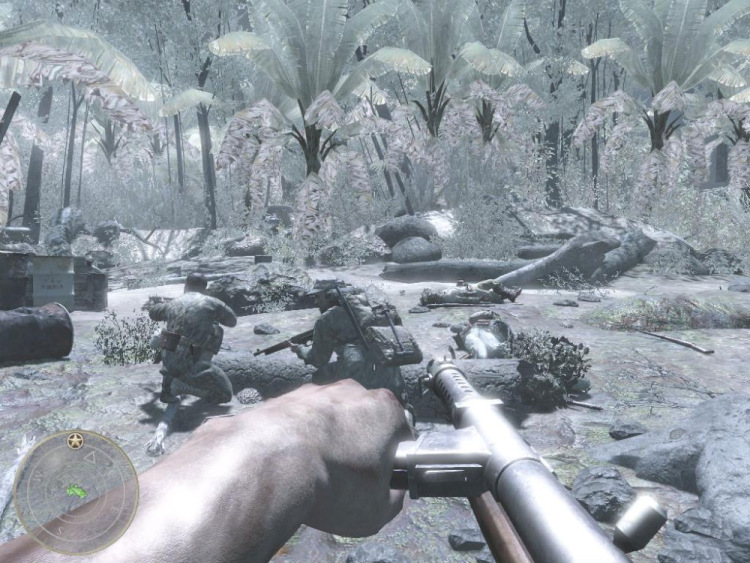 » At long-range approaches to negotiations, they are looking for conditions to exit the war «from a position of strength.» Thousands of belligerents’ lives are wasted to achieve an unrealistic goal. Having found themselves in a state of emergency, our peoples reject normalization as a trap for the enemy and a «spoil» of politicians.
» At long-range approaches to negotiations, they are looking for conditions to exit the war «from a position of strength.» Thousands of belligerents’ lives are wasted to achieve an unrealistic goal. Having found themselves in a state of emergency, our peoples reject normalization as a trap for the enemy and a «spoil» of politicians.
Reluctantly approaching negotiations, the belligerents sharpen the idea of our victory and begin with ultimatum demands to capitulate. It is not easy to get out of the military circle of thinking, to look for solutions outside of it. But the enemies are gradually beginning to change, without even noticing it, and the thought of life after the war appears.
The idea of peace negotiations begins with the desire to control the timing of the war. The need for an interval between the ultimate goal of the strategy and the status quo ceases to be intimidating. Moreover, the interval pause now looks like a time control lever instead of the absurd idea of an absolute victory. The mysticism of «victory», among other things, deprives of control over the time of war.
The mysticism of «victory», among other things, deprives of control over the time of war.
Negotiations as is
The strict rule of negotiation remains the same — to distinguish between military and political goals. The latter belong to presidents and governments, otherwise the controversy about high will slow down the course of military-tactical deals. Political and military goals are different, but belligerents tend to confuse them. Moreover, the interest of military personnel is different from the interest of politicians.
A military man is looking for his author’s victory on the battlefield, jealously evaluating the successes of diplomats. The importance of their independent play should not be forgotten. Mutual intrigues and conflicts are possible here.
The most unexpected topics can be included in the negotiation agenda. You can include at least easing sanctions (albeit with a little sense). The fear of putting something on the negotiation agenda is the fear of being “contaminated by the discussion. ” Behind him lies a deep fear of defeat: will the discussed bonuses become «bonuses» to the enemy? In parallel with the war, the parties are simply playing with each other, and this game is more important for them than the war.
” Behind him lies a deep fear of defeat: will the discussed bonuses become «bonuses» to the enemy? In parallel with the war, the parties are simply playing with each other, and this game is more important for them than the war.
The war range is marked by the occupied territories. These are both assets and liabilities of the parties, but they are also subject to bargaining. Lines of combat contact, each of which is watered with the blood of defenders and attackers, is incredibly difficult to discuss. For a fighter, they are more sacred than the borders of the Motherland, although we are only talking about temporary demarcation lines.
They are not national borders. In the negotiations, the issue of demilitarization along these lines to one depth or another can be freely decided, and this does not set eternal rules. The ensemble of demilitarized zones does not predetermine the boundaries of the peace treaty, but restrains the war and puts it in a bottle.
The parties to the negotiations are especially adamant in demanding worthy and honorable terms of a truce.
Sitting at the peace negotiating table, the parties to the war initially continue to escalate here, achieving what their troops did not achieve. At first, all negotiations are futile. The parties will not immediately move from counter demands to capitulate to playing an endgame that is satisfactory to the parties.
Thus, the Korean War, which ended in dreary altercations in Panmeunjeong, provided an example of an endgame without any victory, which led to a stable compromise peace. The military goal of repelling the aggression of the North and stopping hostilities was achieved at the level of an ordinary truce. Control of Seoul was restored on the territory of South Korea, and the political goal of the negotiations — the impossible «creation of a united democratic Korea» — has not been achieved to this day.
All wars of the West without exception after 1945 years was accompanied by a monotonous refrain: «Appeasement of the enemy is Munich and the road to the second Hitler!» The refrain is empty and destructive in the end. The defect of the «Munich-trauma» is that the fear of bending before the aggressor hides from the belligerent the agenda of problems not solved by the war (according to Gefter). The strategy is created by detachments and orders “Not a step back!”.
All the wars of the West after the Second World War were greeted by an indignant chorus: “No compromises! Pacifying the enemy is the disgrace of Munich!” There was not a US Secretary of State who did not stigmatize «indulging the new Hitlers» before entering into long, painful negotiations with them.
Idealistic war speaks the language of total victory, and that is possible only at a terrible cost. By hiding from the warring parties the post-war agenda of problems that cannot be resolved by war, the discourse of totality drags nations into a meat grinder, demanding to kill, kill, and kill. This war shocks everyone in Europe, but there are no rough sketches of the features of the post-war world. And he will demand not victories, but deradicalization.
War is dirty, disgusting, criminal. But as long as the parties refuse to look for a worthy outcome from it, they drag out the war and force its cruelties. The pathological desire to “win” during negotiations leads to an increase in the price of the settlement. Such negotiations delay the end of the war, but do not bring it closer. It is not «victory» at all, but a political settlement that links the interests of the hostile parties.
The truth of the current war is that no one can win it and therefore does not want to end it.
following author:
- Gleb Pavlovsky
The Carnegie Endowment for International Peace and Carnegie Politika as an organization do not take a common position on socio-political issues. This publication reflects the personal views of the authors and should not be construed as those of the Carnegie Endowment for International Peace.
How to read «War and Peace»: advice from the writer Dmitry Bykov
November 21, 2017Books
Writer and literary critic Dmitry Bykov explains what Tolstoy’s novel is really about and how to read it to make it interesting.
Share
0
Dmitry Bykov
Russian writer, poet, essayist, journalist, literary critic, teacher of literature, radio and TV presenter.
Leo Tolstoy’s novel «War and Peace» is included in most of the world’s best book rankings: Newsweek ranked it first, the BBC ranked it 20th, and the Norwegian Book Club included the novel in the list of the most significant works of all time.
In Russia, a third of the population considers «War and Peace» a work that forms «a worldview that holds the nation together.» At the same time, the president of the Russian Academy of Education, Lyudmila Verbitskaya, said that 70% of school teachers had not read War and Peace. There are no statistics on the rest of the Russians, but, most likely, it is even worse.
Bykov claims that even teachers do not understand everything that is written in the book, not to mention schoolchildren. “I think that Leo Tolstoy himself did not understand everything, did not realize what a gigantic force led his hand,” he added.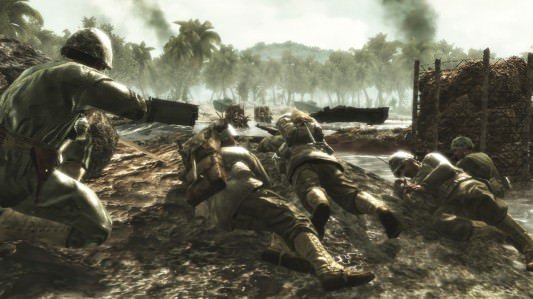
Why read «War and Peace»
According to Bykov, every nation should have its own «Iliad» and «Odyssey». The Odyssey is a travel novel. He tells how the country works. In Russia, this is «Dead Souls» by Nikolai Gogol.
«War and Peace» is a Russian Iliad. It tells how to behave in the country in order to survive.
Tolstoy’s work must be read in order to understand how to win in Russian.
Dmitry Bykov
What is War and Peace about
As the main theme, Tolstoy takes the most irrational period in Russian history — the Patriotic War of 1812. Bykov notes that Napoleon Bonaparte fulfilled all his tasks: he entered Moscow, did not lose the general battle, but the Russians won.
Russia is a country where success is not the same as victory, where people win irrationally. Just about this novel.
Dmitry Bykov
The key episode of the book, according to Bykov, is not the Battle of Borodino, but the duel between Pierre Bezukhov and Fyodor Dolokhov.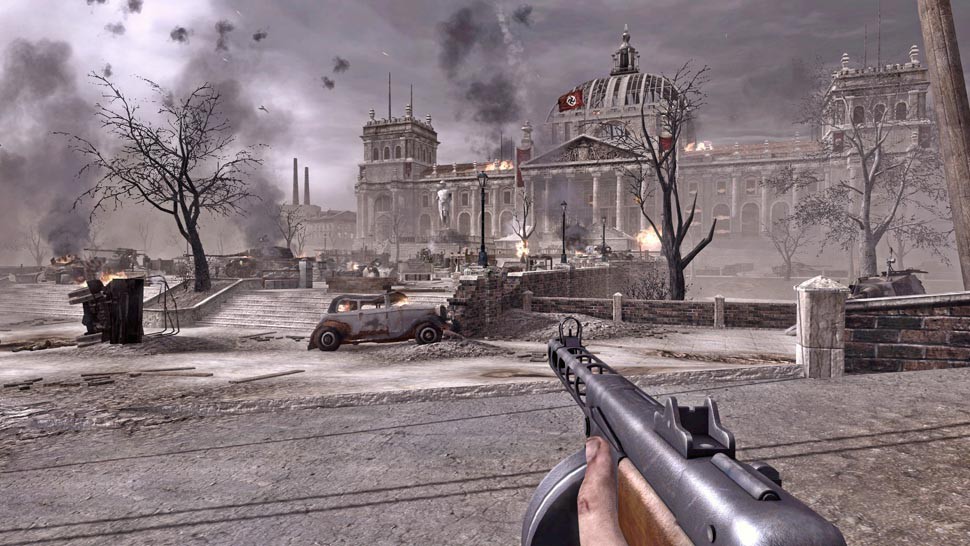 All the advantages are on Dolokhov’s side: society supports him, he is a good shooter. Pierre holds a gun for the second time in his life, but it is his bullet that hits his opponent. This is an irrational victory. And Kutuzov also wins.
All the advantages are on Dolokhov’s side: society supports him, he is a good shooter. Pierre holds a gun for the second time in his life, but it is his bullet that hits his opponent. This is an irrational victory. And Kutuzov also wins.
Dolokhov is definitely a negative character, but not everyone understands why. Despite his virtues, he is a self-conscious evil, self-admiring, «narcissistic vermin.» As did Napoleon.
Tolstoy shows the mechanism of Russian victory: the winner is the one who gives more, who is more ready for sacrifice, who trusts fate. To survive, you need:
- not to be afraid of anything;
- do not calculate anything;
- not admire yourself.
How to read War and Peace
According to Bykov, this irrational novel was written by a rationalist, so it has a rigid structure. Getting to know her makes reading fun.
The action of «War and Peace» takes place in four planes at the same time. In each plane there is a character who fulfills a certain role, is endowed with special qualities and has a corresponding destiny.
* The life of the Russian nobility is an everyday plan with dramas, relationships, suffering.
** Macrohistorical plan — events of the «big history», state level.
*** The people are key scenes for understanding the novel (according to Bykov).
**** The metaphysical plane is an expression of what is happening through nature: the sky of Austerlitz, oak.
Moving along the rows of the table, you can see which characters correspond to the same plan. The columns will show doubles at different levels. For example, the Rostovs are the line of a kind, fertile Russian family. Their strength is in irrationality. They are the soul of the novel.
On the national level, they correspond to the same ingenuous captain Tushin, on the metaphysical — the element of the earth, solid and fertile. At the state level, there is neither soul nor kindness, and therefore there are no correspondences.
The Bolkonskys and everyone who ends up in the same column with them is intellect.
